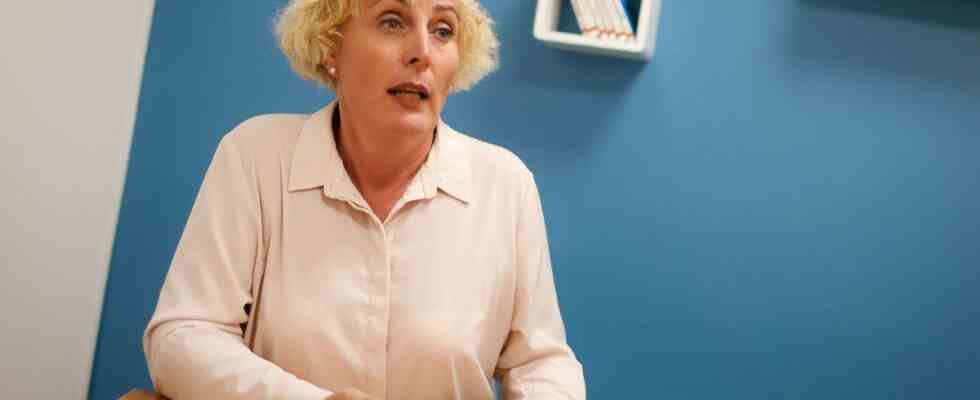There are elections in small villages which are to be marked with a white stone. That of Marie Cau is one of them. On May 23, 2020, she was elected mayor of Tilloy-lez-Marchiennes, 500 inhabitants, in the North. Nothing incredible. Except that on that day, she not only became mayor, but the first openly trans person elected mayor in France. A symbol in a country where equal rights are still not achieved, despite progress. Two years later, Marie Cau vigorously denies being an LGBT activist, but releases a book, Madam Mayor*, which almost takes the form of an autobiography. 20 minutes met her.
What made you want to share your story? Is it linked to the interest aroused by your election?
Yes quite. I didn’t initially want to write a book. When you’re a trans person, you don’t want to expose yourself. We are rather accustomed to masking ourselves. But on the other hand, I got so much positive feedback on my election that I said to myself: “why not? “Because obviously, it is useful for some to see examples of” positive normality “, if one can say that like that. Testimonials from people in the past helped me to understand, so I told myself that I in turn had to do this work of explanation. It’s about telling in a non-political, non-radical way, just a life experience of a person with his joys and his sufferings so that people who are not in the LGBT culture understand. My journey brings the transgender question to a little less dramatized. I wanted to avoid both the political side and the pathos and medical side.
You are indeed giving a very personal account of a very long transition. Until your election as mayor, you always worked under a male identity. Is it also a way of saying that it is still not so easy to transition in France?
It’s still not easy, but it still is. I am 56 years old and what was true twenty to thirty years ago is no longer true today. In my time, there was no course, no follow-up and no treatment. There was no operation, we lived in hiding. When you made a transition, you no longer had a diploma, you no longer had a CV, you left with a blank page. It meant losing your job, losing your family, being rejected. We were called mentally ill. We had to live a kind of double life. Today, young trans people can start a new life.
You made a transition without going through the shrink box, which is still very, very rare. Was it to have more freedom?
Yes, because at the time, I tried: I was insulted by very aggressive shrinks who made me pass for a mental patient. At best, like a repressed homosexual person. Nope ! I know my orientation, I have always liked women. There was complete incompetence among the shrinks, it was a hostile environment that tried to convince you or you were delusional and you had to get back on the right track. Paying 100 euros every week for someone who hates you, frankly, I threw in the towel. I thought to myself that I could manage. In fact, anything I could do without a doctor’s approval, I did. But I was able to do it also because I had a financial well-being that gave me the means. Which is not possible today for young trans people who don’t have that ability. They must pass under the caudine forks of a multidisciplinary medical team which, even today, sets its conditions.
You rightly say in the book that trans women have no room for error when it comes to their physical appearance. Would you say it’s the same for you as mayor?
It’s clear. They are waiting for me at the turn. As long as I succeed in my projects, as long as I have success in my commune, I’ll be fine. But at the first misstep it is sure that people will say “You saw this trans woman, she is incompetent…” It is clear that there are people who are waiting at the edge of the wood for the first mistake or the first difficulty.
Do you already feel transphobia in the exercise of your function or does the mayor’s authority change the situation?
The authority of mayors is a game-changer. So it’s much more hypocritical. You are entitled to smiles, handshakes, but strangely, the files are not moving forward, there are blockages, things left unsaid. And we know through intermediaries that there were transphobic words.
The difference is neither a defect nor a quality, you say. Can’t the stages and pitfalls of a trans person’s life be more? Some high-level LGBT athletes explained after their career that this experience had helped them lead their careers…
You are quite right. For me, it was cathartic. In life, we have trials, either we transcend them and we grow, we rise and we draw strength from them, or we collapse, we self-destruct and we disappear. The successive ordeals made me grow. But I know that trans people haven’t been able to overcome that, because it’s still a hell of a course of obstacles to face: professional, family, financial, health difficulties… I’ve often wondered if transidentity , for me, was a curse or a blessing. I know today is a blessing. But for a long time I took it for a curse. They kept pissing me off just because I existed. I disturbed people. Finally, it allowed me to grow, to better understand myself, to understand others and to have a more spiritual than political elevation and to have a lot of perspective. It allowed me to take a lot of height compared to people who are in the fight and not in the debate.

